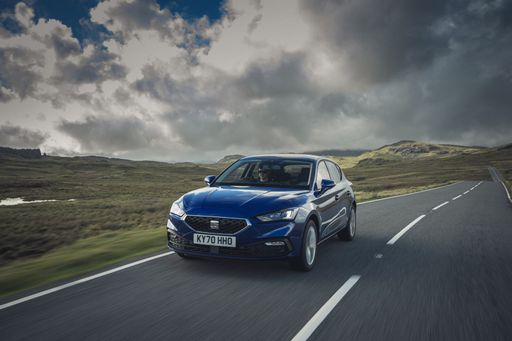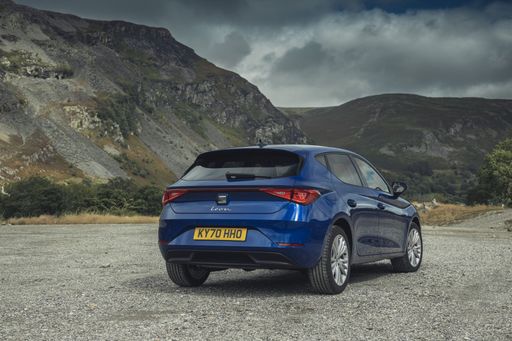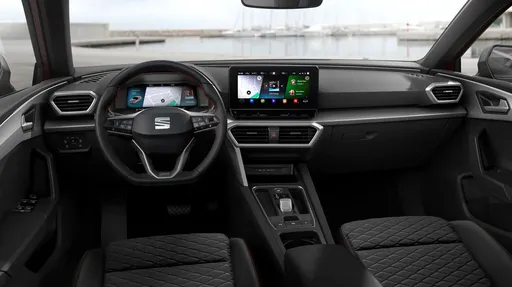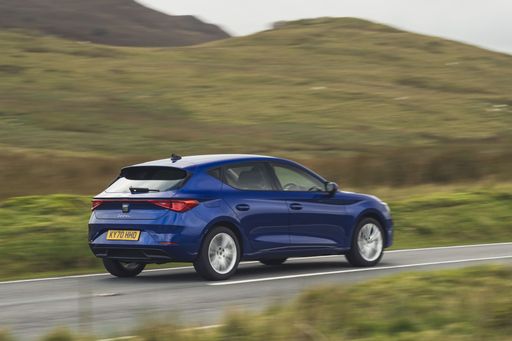SEAT Leon vs Toyota C-HR - Differences and prices compared
Compare performance (272 HP vs 223 HP), boot space and price (24500 £ vs 29100 £ ) at a glance. Find out which car is the better choice for you – SEAT Leon or Toyota C-HR?
Costs and Efficiency:
Price and efficiency are often the first things buyers look at. Here it becomes clear which model has the long-term edge – whether at the pump, the plug, or in purchase price.
SEAT Leon has a slightly advantage in terms of price – it starts at 24500 £ , while the Toyota C-HR costs 29100 £ . That’s a price difference of around 4680 £.
Fuel consumption also shows a difference: SEAT Leon manages with 1.20 L and is therefore clearly more efficient than the Toyota C-HR with 2.30 L. The difference is about 1.10 L per 100 km.
As for electric range, the SEAT Leon performs decisively better – achieving up to 133 km, about 67 km more than the Toyota C-HR.
Engine and Performance:
Under the bonnet, it becomes clear which model is tuned for sportiness and which one takes the lead when you hit the accelerator.
When it comes to engine power, the SEAT Leon has a to a small extent edge – offering 272 HP compared to 223 HP. That’s roughly 49 HP more horsepower.
In acceleration from 0 to 100 km/h, the Toyota C-HR is minimal quicker – completing the sprint in 7.40 s, while the SEAT Leon takes 7.70 s. That’s about 0.30 s faster.
Space and Everyday Use:
Whether family car or daily driver – which one offers more room, flexibility and comfort?
Both vehicles offer seating for 5 people.
In curb weight, SEAT Leon is a bit lighter – 1344 kg compared to 1505 kg. The difference is around 161 kg.
In terms of boot space, the Toyota C-HR offers to a small extent more room – 447 L compared to 380 L. That’s a difference of about 67 L.
When it comes to payload, SEAT Leon somewhat takes the win – 521 kg compared to 425 kg. That’s a difference of about 96 kg.
Who wins the race in the data check?
The SEAT Leon sits well ahead of its rival in the objective data comparison.
This result only shows which model scores more points on paper – not which of the two cars feels right for you.
Costs and Consumption
View detailed analysis
Engine and Performance
View detailed analysis
Dimensions and Body
View detailed analysis

SEAT Leon
SEAT Leon
SEAT Leon pairs sharp, modern styling with a cabin that's sensible and slightly sporty, making it an appealing choice for buyers who want flair without fuss. It drives with eager composure and offers a neat balance of comfort and agility, so you get everyday usability with a wink of fun.
details



Toyota C-HR
The Toyota C-HR cuts a striking figure with its angular styling and coupe-like profile, so you’ll never go unnoticed in the supermarket car park. It balances everyday practicality with a nimble, city-friendly personality, making routine commutes feel a touch more fun without asking for forgiveness.
details




Costs and Consumption |
|
|---|---|
|
Price
24500 - 36400 £
|
Price
29100 - 42800 £
|
|
Consumption L/100km
1.2 - 5.5 L
|
Consumption L/100km
2.3 - 5.1 L
|
|
Consumption kWh/100km
-
|
Consumption kWh/100km
-
|
|
Electric Range
133 km
|
Electric Range
66 km
|
|
Battery Capacity
19.70 kWh
|
Battery Capacity
-
|
|
co2
27 - 126 g/km
|
co2
52 - 116 g/km
|
|
Fuel tank capacity
40 - 45 L
|
Fuel tank capacity
-
|
Dimensions and Body |
|
|---|---|
|
Body Type
Hatchback
|
Body Type
SUV
|
|
Seats
5
|
Seats
5
|
|
Doors
5
|
Doors
-
|
|
Curb weight
1344 - 1657 kg
|
Curb weight
1505 - 1755 kg
|
|
Trunk capacity
270 - 380 L
|
Trunk capacity
350 - 447 L
|
|
Length
4368 mm
|
Length
-
|
|
Width
1799 mm
|
Width
1832 mm
|
|
Height
1442 - 1460 mm
|
Height
-
|
|
Max trunk capacity
1187 - 1301 L
|
Max trunk capacity
-
|
|
Payload
473 - 521 kg
|
Payload
375 - 425 kg
|
Engine and Performance |
|
|---|---|
|
Engine Type
Petrol, Petrol MHEV, Plugin Hybrid, Diesel
|
Engine Type
Full Hybrid, Plugin Hybrid
|
|
Transmission
Manuel, Automatic
|
Transmission
Automatic
|
|
Transmission Detail
Manual Gearbox, Dual-Clutch Automatic
|
Transmission Detail
CVT
|
|
Drive Type
Front-Wheel Drive
|
Drive Type
Front-Wheel Drive, All-Wheel Drive
|
|
Power HP
116 - 272 HP
|
Power HP
140 - 223 HP
|
|
Acceleration 0-100km/h
7.7 - 10.5 s
|
Acceleration 0-100km/h
7.4 - 9.9 s
|
|
Max Speed
197 - 220 km/h
|
Max Speed
-
|
|
Torque
220 - 360 Nm
|
Torque
-
|
|
Number of Cylinders
4
|
Number of Cylinders
4
|
|
Power kW
85 - 200 kW
|
Power kW
103 - 164 kW
|
|
Engine capacity
1498 - 1968 cm3
|
Engine capacity
1798 - 1987 cm3
|
General |
|
|---|---|
|
Model Year
2024 - 2026
|
Model Year
2026
|
|
CO2 Efficiency Class
D, B
|
CO2 Efficiency Class
C, D, B
|
|
Brand
SEAT
|
Brand
Toyota
|
What drive types are available for the SEAT Leon?
The SEAT Leon is available as Front-Wheel Drive.
